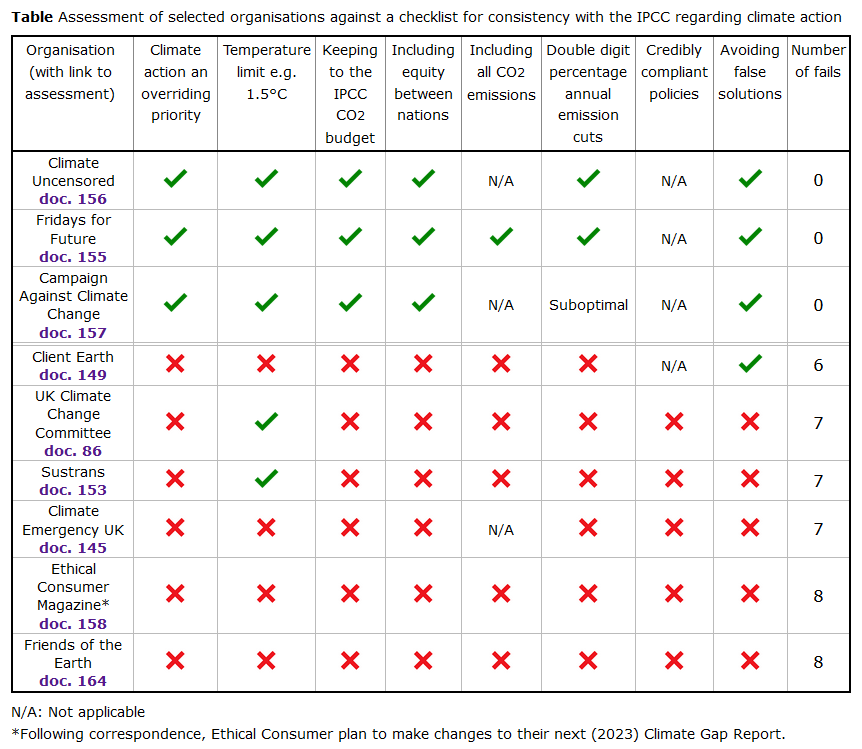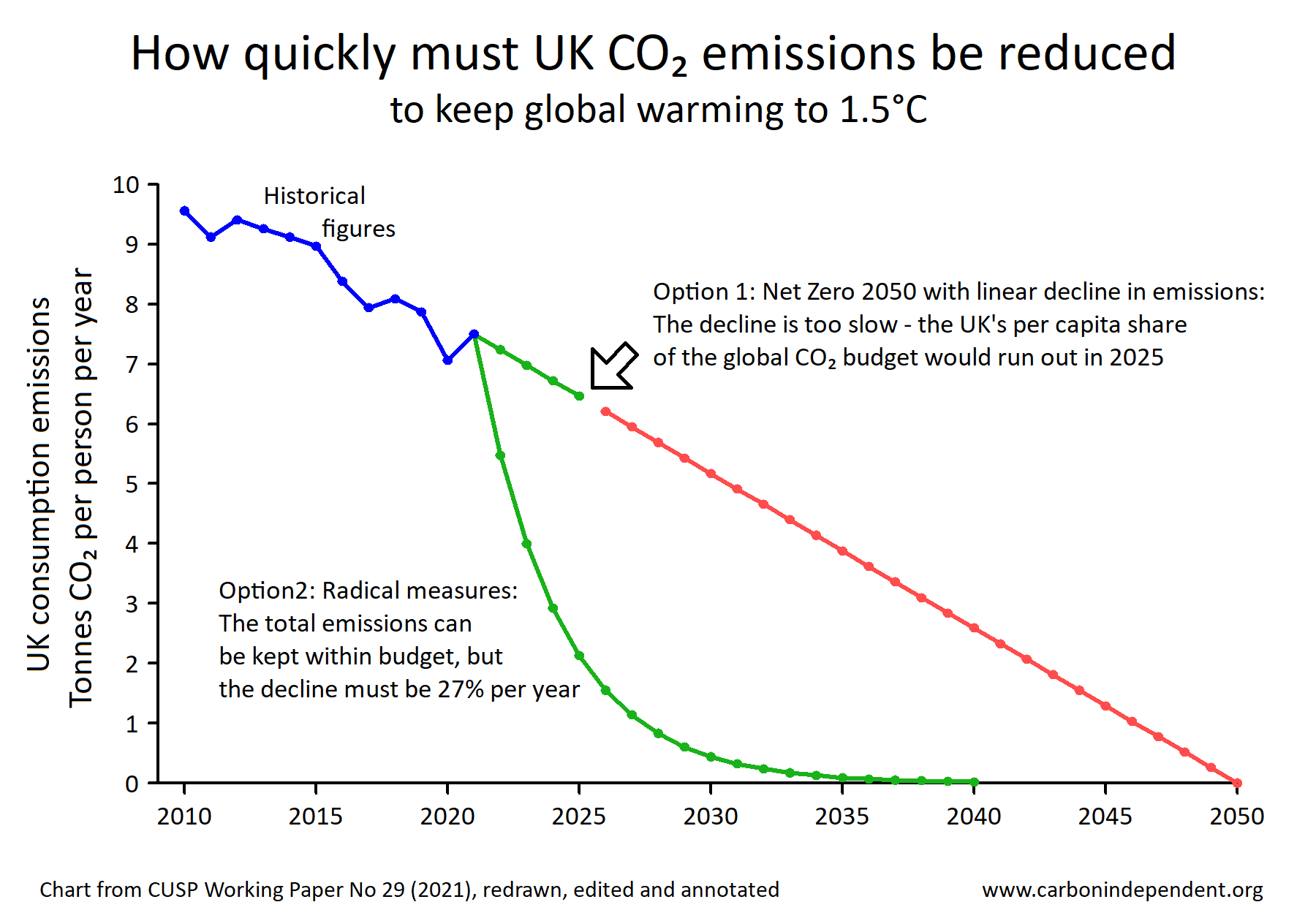
Friends of the Earth: Climate denial 2: Response to CCC annual report 2023
This assessment of a recent communication from Friends of the Earth (FoE) found it to be very far from consistent with the IPCC regarding the urgency of climate action, and consequently that it is contributing to climate denial.
FoE is the UK's largest grassroots environmental organisation. In June 2023, the UK Climate Change Committee (CCC) issued a report, and a response was posted by FoE on its website. FoE's response is assessed here using a checklist for consistency with the IPCC regarding climate action.
The findings are that the FoE response is very far from being consistent with the climate science and the Paris and other international agreements. The fundamental flaw is that the FoE response endorses the UK Government's timescale of emission cuts, but this timescale is not in line with the what the IPCC says needs to be done. Cuts need to be three times faster.
FoE is contradicting and undermining the IPCC, and the climate scientists, economists and campaigning groups who are trying to publicise the need for urgent radical cuts in emissions. FoE is aware that the timescale of cuts is inadequate, and so it is knowingly misleading its members and the wider public about the urgency of action in the climate emergency.
If FoE wants to help limit global warming to 1.5°C, it should ensure that its reporting is in line with the climate science.
Until it does so, FoE cannot be regarded as a "trusted source", and its statements cannot be used as a basis for planning climate action.
FoE is the UK's largest grassroots environmental organisation. In June 2023, the UK Climate Change Committee (CCC) issued a report, and a response was posted by FoE on its website. FoE's response is assessed here using a checklist for consistency with the IPCC regarding climate action.
Summary table Assessment against a checklist for consistency with the IPCC regarding climate action
| Climate action an overriding priority | Temperature limit e.g. 1.5°C | Keeping to the IPCC CO2 budget | Including equity between nations | Including all CO2 emissions | Double digit percentage annual emission cuts | Credibly compliant policies | Avoiding false solutions | Number of fails | |
|---|---|---|---|---|---|---|---|---|---|
| Friends of the Earth |  |  |  |  |  |  |  |  | 8 |

This assessment can be compared with the assessments for other groups via the summary table in document 154.
The organisation: Friends of the Earth
Friends of the Earth (FoE) (https://friendsoftheearth.uk) is the UK's largest grassroots environmental organisation.Document assessed: The FoE response to the CCC annual report 2023
The document assessed was the web page Climate Change Committee says government action worryingly slow [1] (https://friendsoftheearth.uk/climate/climate-change-committee-says-government-action-worryingly-slow). FoE's web page was a response to the annual report of the UK's Climate Change Committee .The FoE response was assessed using a checklist to assess consistency with the IPCC regarding climate action - see document 138.
There are concerns that climate denial in various forms is widespread throughout society [2]. Some individuals and organisations accept the basic science of climate change, and the interpretation that the climate is changing due to burning of fossil fuels by mankind - but deny or minimise the psychological, political, and moral implications of the facts, fail to accept responsibility for responding, and fail to act in the way that the information implies, which is termed implicatory denial by sociologists [2].
Assessment
A summary of the assessment is given at the top of this web page. Details of the checklist elements are given here.1. Is climate action an overriding priority, on the basis of e.g. the gross injustice?
NO - the FoE response contains no mention of the international injustice from continued use of fossil fuels, or of other factors that make climate change an overriding priority. The emphasis is merely on complying with the UK's emission reduction targets under the Climate Change Act, without considering whether this timescale is adequate.
2. Is a limit to global warming specified, generally 1.5°C?
NO - the FoE response contains no mention of the 1.5°C target.
3. Is there adherence to the IPCC CO2 budget? Is the mechanism for limiting global warming clearly stated to be limiting further total global CO2 emissions to the CO2 budget specified by the IPCC?
 NO - the FoE response does not mention the IPCC CO2 budget - the targets are merely those of the UK Government under the Climate Change Act, which are grossly inadequate for keeping global warming to 1.5°C.
NO - the FoE response does not mention the IPCC CO2 budget - the targets are merely those of the UK Government under the Climate Change Act, which are grossly inadequate for keeping global warming to 1.5°C. This is illustrated by the chart, and is discussed in detail in the assessment of the CCC in document 86.
4. Is equity between nations incorporated? Are the implications of the international commitments to global equity properly taken into account, i.e. that developed nations cut emissions faster than the global average?
NO - the FoE response ignores the commitment in the Paris Agreement [3] for developed countries to cut emissions faster than the global average, and discusses only the UK Government's grossly inadequate timescale of emission cuts.
5. Are all CO2 emissions included, especially those embodied in imports and exports and those from aviation and shipping?
NO - the FoE response discusses only the UK Government's grossly inadequate timescale of emission cuts.
6. Is the size of appropriate annual emission cuts specified e.g. double digit percentage cuts in developed countries?
NO - much smaller emission cuts are implied by the policies proposed.
7. Are any policies discussed consistent with this timescale?
NO - the policies discussed do not comply .
8. Are false solutions avoided?
NO - several false solutions are mentioned including planting trees .
In summary, the FoE response fails on all eight points on the checklist.
Two related 2021 FoE documents
1. Faster, deeper and fairer carbon pollution cuts neededIn Jan 2021, FoE published a report saying that the CCC's timescale of cuts is inadequate [4]. The following is the section on budgets.
A fairer, safer and more equitable budget2. Tackling climate breakdown — how do government strategies measure up?The CCC's recommended pathway is in line with the UK making a fair share of the global cuts necessary to avoid 2 degrees of warming. But if the world is to avoid exceeding 1.5 degrees, then the UK's fair share of the remaining emissions allowed would require cuts of around 75% by 2030 compared to 1990 levels — not the 64% proposed in the CCC pathway.As the first industrialised nation built using coal, if we also consider the UK's historical contribution to climate change, then reductions of 90% are needed. And these figures don't include the carbon impact of our imports.
In Nov 2021, FoE published an assessment of the UK Government's strategies [5]. This confirmed that FoE considers the emission reduction timescale to be inadequate via its seection What does all this add up to?:
The government says its Net Zero Strategy puts it on track to deliver the Climate Change Act's legally binding carbon emissions reductions — which Friends of the Earth argues are insufficient in any case.So FoE is aware that the UK Government's timescale of emission cuts is grossly inadequate for a limit of 1.5°C, but is now endorsing it.
Conclusion
The findings are that the FoE response is not consistent with the climate science and what the IPCC says needs to be done.The fundamental flaw is that the FoE response endorses the UK Governments emission reduction targets, but these are the wrong targets - cuts need to be three times faster to adhere to the UK's international commitments. There are two main differences. Firstly, the UK Government timescale ignores the commitment in the Paris Agreement for emissions in developed countries to fall faster than the global average in order to allow emissions in developing countries to rise for a period, while they develop economically. Translating the Paris Agreement commitment to equity between countries into equal per capita shares of the residual CO2 budget means that the UK should cut emissions twice as fast as the global average. The second crucial point is that the UK Government counts only territorial emissions in its CO2 budgetting, which effectively counts imports as zero-carbon. Making proper allowance for all emissions for which the UK is responsible means emission cuts have to be a further 50% faster, i.e. three times faster when combining both factors.
In 2021, FoE published two reports saying that the CCC's timescale of cuts is inadequate [4][5] (see above) - so it is knowingly misleading other campaigning groups and misleading its supporters.
FoE is failing to communicate the extreme urgency of action. It is misleading other campaigning groups and misleading its supporters, and is contributing to the widespread climate implicatory denial.
FoE cannot be regarded as a "trusted source", and its statements cannot be used as a basis for planning climate action.
See also: Friends of the Earth: Climate denial 1: Court case 2022 (document 139).
References
| [1] | Climate Change Committee says government action worryingly slow (Jun 2023) https://friendsoftheearth.uk/climate/climate-change-committee-says-government-action-worryingly-slow. |
| [2] | Iain Walker and Zoe Leviston (2019) There are three types of climate change denier - and most of us are at least one The Conversation https://theconversation.com/there-are-three-types-of-climate-change-denier-and-most-of-us-are-at-least-one-124574 |
| [3] | The Paris Agreement (2015)https://unfccc.int/files/meetings/paris_nov_2015/application/pdf/paris_agreement_english_.pdf |
| [4] | Mike Childs, Friends of the Earth (Jan 2021) Faster, deeper and fairer carbon pollution cuts needed https://policy.friendsoftheearth.uk/insight/faster-deeper-and-fairer-carbon-pollution-cuts-needed |
| [5] | Mike Childs, Friends of the Earth (Nov 2021) Tackling climate breakdown – how do government strategies measure up? https://policy.friendsoftheearth.uk/insight/tackling-climate-breakdown-how-do-government-strategies-measure |
First published: 18 Jul 2023
Last updated: 5 Nov 2024

 ✖
✖